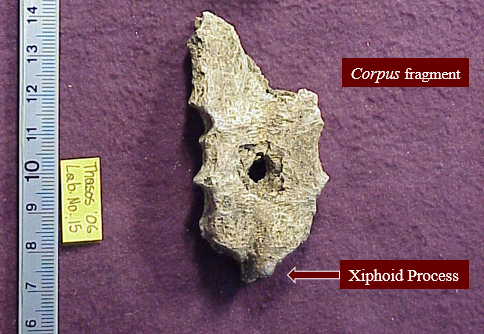
The Greek island of Thasos is one of the jewels of the Aegean Sea and a popular tourist destination. But 2,000 years ago, it was the setting for what appears to be a gruesome and bizarre execution, according to research conducted by an interdisciplinary team.
Anthropologist Anagnostis Agelarakis from Adelphi University, in New York, and his students were carrying out investigations at the ancient necropolis of Thasos when they uncovered the remains of 57 individuals, including a man with strange, almost perfectly circular, hole in his chest.
In a paper set to be published in the journal Access Archaeology, Agelarakis suggests that the man was killed by a single blow with a sharp, seven-sided spear tip that pierced his sternum, likely causing cardiac shock and arrest, leading to death within about a minute.
"My position based on interdisciplinary analysis, but particularly based on archaeological forensics, is that this was a violent death—an execution," Agelarakis told Newsweek.
Initially, the researchers thought that the hole in the man's chest—which measures about half an inch across—was the result of a developmental issue known as sternal foramen. However, on closer inspection, it became apparent that the hole was created by a traumatic injury that penetrated the bone.
To understand more about how the injury was created, Agelarakis collaborated with researchers from the departments of anthropology, art and physics at Adelphi to create a bronze cast of an ancient seven-sided thrusting spear known as a styrax. They then used this weapon to inflict various different injuries on a human dummy that's normally used for ballistics testing.
As a result of these tests, the team came to the conclusion that the injury was not produced by a spear being thrown—the way it arcs in the air would produce a different kind of hole on impact. Instead, they believed that an expert executioner thrust the styrax into the man's chest from close range with an "extreme level" of force while he was physically restricted in some way—tied down, perhaps.
"The trauma points to a well calculated thrusting strike by an experienced hand at a precise anatomic point known that it could and would provide for a fast and irrefutable way to kill," Agelarakis said in a statement.
While we don't have much information about the man's life, evidence from the remains and burial site suggested that the he was not a petty criminal executed for a crime but a high-status individual who was sentenced to death during a time of political turmoil and warfare.
"He was discovered in a necropolis from the Hellenistic period buried alongside a cluster of, most probably, family relatives," Agelarakis told Newsweek. "I take the position that he must have been an important person who was executed because of his position in society, in the military, or in political affairs—or all of the above."
Further analysis of the man's remains suggested he was well-built and lived a physically active life, although there appeared to be a brief period just prior to his death when the food he was eating dropped in quality. The evidence also indicated that the man died in his 50s, in what was likely a tumultuous time for the people of the island state, and the ancient Hellenic world in general.
"We don't have an incredible amount of data from Thasos Island during this period, but the Hellenistic time period—that is, after the death of Alexander the Great, in 323 B.C.—was definitely one that saw incredible developments, among them the spread of Hellenism and an ancient type of globalization pattern," Agelarakis said. Furthermore, there was "advancement in the sciences, in the roadways, in the building of cities, theatres, gymnasiums, libraries, trade."
"It was certainly a period of growth and development but also, unfortunately, one that saw conflict between the successors of Alexander the Great," he said. "And Thasos could not have been excluded from that because it was located in a very strategic place controlling the sea routes from the [Greek] mainland of Thrace and Macedonia toward the Black Sea, Asia Minor and the rest of the Aegean."
According to Agelarakis, Thasos boasted rich natural resources—including excellent quality marble deposits, gold, silver, as well high-quality lumber that was prime material for building houses and boats—which drew people from around the region.
Over time, the island state became, rich, powerful and widely known in the trade routes of the Aegean Sea and Eastern Mediterranean—with the help of its "excellent navy."
Uncommon Knowledge
Newsweek is committed to challenging conventional wisdom and finding connections in the search for common ground.
Newsweek is committed to challenging conventional wisdom and finding connections in the search for common ground.
About the writer
Aristos is a Newsweek science reporter with the London, U.K., bureau. He reports on science and health topics, including; animal, ... Read more
To read how Newsweek uses AI as a newsroom tool, Click here.








